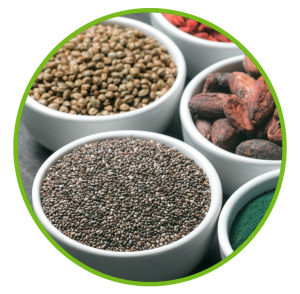Seeds
RECOMMENDATION

Add some raw or toasted seeds to your salads to add a crunch and a punch of quality proteins and fats. Add them to your breakfast for a delicious granola or porridge alternative that contains no refined carbohydrates.
Quinoa can make a delicious warm or cold salad with roasted veggies, olive oil and lemon.
Why Seeds are good for us
CONSUME DAILY
Seeds such as Chia, Hemp, Flax, Linseed, Sesame and Quinoa
Seeds are little packages of goodness which provide a tonne of nutrition. They offer a great source of plant-based protein and fats as well as adding a lovely texture to meals.
More than 25% of hemp seeds total calories are from high quality protein. They are rich in healthy fats and have a 3.1 ratio of omega-6 to omega 3 which may benefits skin disease and provide relief from eczema and uncomfortable symptoms.
Hemp has a botanical relationship to drug/medical varieties of cannabis; however, hemp seed no longer contain psychotropic action and instead may provide significant health benefit.
Flax seeds have two anticancer components lignans and omega-3 fat called alpha linolenic acid (ALA). They are also a great source of dietary fibre and often prescribed for their laxative effect, Regular consumption may also help lower your cholesterol levels.
In cell studies, lignans increase antioxidants, anti-inflammatory and carcinogen-deactivating enzymes. They also decrease growth and increase self-destruction of cancer cells. In studies with mice, lignans and flaxseed decreased cancer development and growth.
Chia seeds are another food rich in ALA, which might provide protection against breast cancer and cervical cancer. Chia seeds have also been shown to reduce the risk of cardiovascular disease. When in contact with fluid, chia is a great binding agent, creating a jelly like outer layer. Try soaking chia overnight in coconut milk for a delicious nutritious breakfast. You can also grow chia seeds in soil or coconut fibre and eat the shoots.
Quinoa is in rich by fibre and minerals such as iron, magnesium and calcium. Just like other seeds, quinoa is a protein-rich alternative for animal proteins such as beef or fish and a great lower carb and more nutritious substitute for rice and pasta. Quinoa seems to have several types of saponins, suggesting they could be used to help prevent and treat inflammation. The saponins can target inflammatory pathways linked to cancer and slow them down or on some cases perhaps even turn them off completely.
